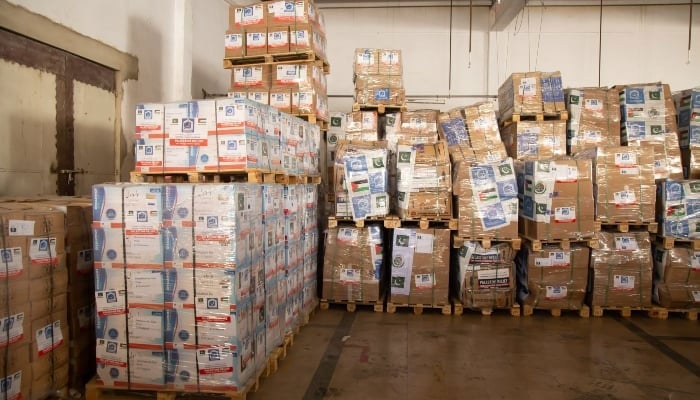Pakistan sends eighth tranche of humanitarian aid for Gaza
The Security Council had blocked Palestine’s bid to become a full member of the UN
ISLAMABAD: Foreign Minister Ishaq Dar on Sunday said Pakistan has dispatched its eighth tranche of humanitarian assistance for Gaza through sea. The 400 tonnes of aid consists of “winterized tents, tarpaulins, blankets, medicines and food supplies”.
In a post on X, Dar said the shipment would be received by the Pakistani ambassador to Egypt at Port Said and handed over to the Egyptian Red Crescent for onward delivery to the people of Gaza.
“Pakistan remains committed to addressing the urgent humanitarian needs of our brothers and sisters in Gaza,” he said.
Since the conflict broke out in Palestine on October 7, 2023, Pakistan has continuously been raising its voice against the Israeli atrocities and sending aid time and again.
Pakistan on April 19 regretted the United States decision to veto the draft resolution seeking Palestine’s full membership of the United Nations and expressed its disappointment at the UN Security Council’s inability to reach a consensus on the matter.
“Pakistan is deeply disappointed by the result of last night’s debate at the UNSC and its inability to reach a consensus and recommend Palestine’s membership to UN General Assembly,” Foreign Office spokesperson Mumtaz Zahra Baloch had said in her weekly press briefing. “We regret the US decision to veto the draft resolution granting full membership of the UN to Palestine,” she had added.
The Security Council had blocked Palestine’s bid to become a full member of the UN due to a US veto on a widely supported resolution that would have recommended the granting of such status. The proposal, submitted to the 15-member Council by Algeria, received 12 votes in favour, with the US casting a negative vote and Switzerland and the United Kingdom abstaining.
-
 Savannah Guthrie Sends Desperate Plea To Mom Nancy Kidnapper
Savannah Guthrie Sends Desperate Plea To Mom Nancy Kidnapper -
 NBA All-Star 2026 Shake-up: Inside The New USA Vs World Tournament Format
NBA All-Star 2026 Shake-up: Inside The New USA Vs World Tournament Format -
 Warner Bros Consider Reopening Deal Talks With Paramount, Says Reports
Warner Bros Consider Reopening Deal Talks With Paramount, Says Reports -
 Andrew Mountbatten Windsor Faces Future With UK MPs, Says Expert
Andrew Mountbatten Windsor Faces Future With UK MPs, Says Expert -
 Shamed Andrew Told 'nobody Is Above The Law' Amid Harrowing Silence
Shamed Andrew Told 'nobody Is Above The Law' Amid Harrowing Silence -
 Gisele Bundchen Melts Hearts With Sweet Bike Ride Glimpse Featuring Son
Gisele Bundchen Melts Hearts With Sweet Bike Ride Glimpse Featuring Son -
 Prince William Found Meghan Markle ‘quite Refreshing’ At Start
Prince William Found Meghan Markle ‘quite Refreshing’ At Start -
 Kate Middleton Knew Should Could Not Be ‘voice Of Reason’ With Prince Harry
Kate Middleton Knew Should Could Not Be ‘voice Of Reason’ With Prince Harry -
 Rihanna Has Wardrobe Malfunction At A$AP Rocky Fashion Show
Rihanna Has Wardrobe Malfunction At A$AP Rocky Fashion Show -
 Prince Harry Felt System Had ‘one Rule For Him, One For Prince William’
Prince Harry Felt System Had ‘one Rule For Him, One For Prince William’ -
 Jake Paul's Fiancée Sends Him Over The Moon Over Stunning Victory
Jake Paul's Fiancée Sends Him Over The Moon Over Stunning Victory -
 Harper Beckham Sends Valentine’s Love Amid Brooklyn Family Drama
Harper Beckham Sends Valentine’s Love Amid Brooklyn Family Drama -
 Why Prince William, Kate Middleton 'partnership' Is Important For Monarchy
Why Prince William, Kate Middleton 'partnership' Is Important For Monarchy -
 Katie Price Drama Escalates As Family Stays In Touch With Ex JJ Slater
Katie Price Drama Escalates As Family Stays In Touch With Ex JJ Slater -
 Critics Target Palace Narrative After Andrew's Controversy Refuses To Die
Critics Target Palace Narrative After Andrew's Controversy Refuses To Die -
 Sarah Ferguson’s Delusions Take A Turn For The Worse: ‘She’s Been Deserted’
Sarah Ferguson’s Delusions Take A Turn For The Worse: ‘She’s Been Deserted’




